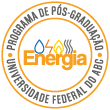Banca de QUALIFICAÇÃO: ANA PAULA PEREIRA DA SILVEIRA
Uma banca de QUALIFICAÇÃO de DOUTORADO foi cadastrada pelo programa.DISCENTE : ANA PAULA PEREIRA DA SILVEIRA
DATA : 11/11/2019
HORA: 19:00
LOCAL: sala 304, 3º andar, Bloco B, Campus SA da Fundação Universidade Federal do ABC, localizada na Avenida dos Estados, 5001, Santa Terezinha, Santo André, SP
TÍTULO:
Contribution to improve energy efficiency in water distribution systems managed by Sabesp - Case Studies analysis in RMSP
PÁGINAS: 210
GRANDE ÁREA: Engenharias
ÁREA: Engenharia Civil
SUBÁREA: Engenharia Hidráulica
ESPECIALIDADE: Hidráulica
RESUMO:
The supply of drinking water is an essential service for any municipality and because they are highly complex systems, they have a great demand for electric energy, constituting a significant expense to the sanitation companies. Only SABESP is responsible for the consumption of 0.55% of energy in Brazil. Therefore, there is a need for the creation and improvement of energy efficiency projects in the sector, mainly due to the fact that energy efficiency and hydraulic performance of the water distribution systems are related. The objective of this thesis was to study energy efficiency in the operation of the distribution of drinking water using practical cases corresponding to systems managed by SABESP in the Metropolitan Region of São Paulo (MRSP), correlating the consumption of electric energy with the reduction of losses and regularity of distribution of water in supply sectors under night-time management regime and in supply sectors with performance contract, maintaining the guarantee of the water supply to the clients, thus guaranteeing the sustainability of the efficiency actions, through the analysis of data series of electric energy consumption, hydraulic parameters and customer relations in the period from 2013 to 2018.
MEMBROS DA BANCA:
Presidente - Interno ao Programa - 235.788.548-32 - HERLANDER DA MATA FERNANDES LIMA - NENHUMA
Membro Titular - Examinador(a) Interno ao Programa - 1548098 - GILBERTO MARTINS
Membro Titular - Examinador(a) Externo ao Programa - 2197500 - MELISSA CRISTINA PEREIRA GRACIOSA
Membro Suplente - Examinador(a) Interno ao Programa - 1646410 - ROSELI FREDERIGI BENASSI
Membro Suplente - Examinador(a) Externo à Instituição - GUSTAVO ADOLFO RONCEROS RIVAS




